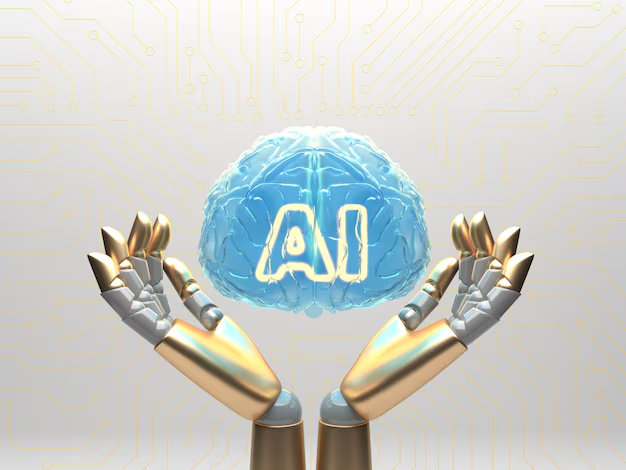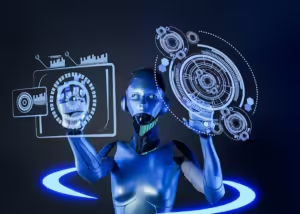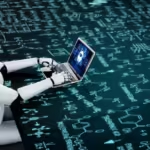Artificial Intelligence (AI) and quantum computing are two of the most groundbreaking technologies shaping the future of computation. While AI enables machines to learn, adapt, and make decisions, quantum computing offers unparalleled processing power by leveraging the principles of quantum mechanics. The convergence of these two fields has the potential to unlock new computational possibilities, revolutionizing industries from healthcare and finance to materials science and cybersecurity.
Traditional computers struggle with highly complex problems due to their limitations in processing speed and memory. Quantum computers, however, can process massive amounts of data simultaneously, making them ideal for enhancing AI-driven applications. By harnessing quantum computing, AI algorithms can solve intricate optimization problems, accelerate deep learning models, and improve decision-making processes at an unprecedented scale.
In this blog, we will explore how AI and quantum computing intersect, their real-world applications, the challenges involved, and what the future holds for this exciting technological synergy.

The Intersection of AI and Quantum Computing
AI and quantum computing are two distinct yet highly complementary fields that, when combined, have the potential to revolutionize computational capabilities. AI thrives on data processing, pattern recognition, and complex decision-making, but its effectiveness is often constrained by the limitations of classical computing hardware. Quantum computing, with its ability to process vast amounts of data simultaneously through quantum parallelism, provides a way to overcome these challenges.
Why AI Needs Quantum Computing
Despite significant advancements, classical computers struggle with AI’s growing computational demands, especially in areas like deep learning and optimization. Quantum computing can enhance AI by:
- Accelerating AI Training Models: Quantum computers can process complex datasets faster, reducing the time required to train machine learning models.
- Handling Large-Scale Optimization Problems: Many AI applications involve optimization (e.g., supply chain logistics, financial modeling), which quantum algorithms can solve exponentially faster.
- Enhancing Neural Networks: Quantum computing can improve AI’s ability to learn from data, leading to more accurate and efficient models.

How AI Enhances Quantum Computing
Conversely, AI plays a crucial role in improving quantum computing capabilities by addressing some of its key challenges:
- Quantum Error Correction: Quantum systems are highly susceptible to noise and errors. AI-powered error correction techniques help stabilize quantum computations, making them more reliable.
- Optimizing Quantum Algorithms: AI helps refine quantum algorithms to ensure they run efficiently, reducing resource consumption.
- Managing Quantum Data: AI-driven approaches assist in interpreting and managing the vast amount of data generated by quantum computations.

Real-World Applications of AI-Quantum Synergy
The fusion of AI and quantum computing is already making an impact in various fields:
- Drug Discovery: AI and quantum computing accelerate molecular simulations, leading to faster drug development.
- Cryptography and Cybersecurity: Quantum-AI integration strengthens encryption and security mechanisms.
- Financial Modeling: AI-driven quantum models enhance risk analysis and portfolio optimization.
- Climate Modeling: Quantum-powered AI algorithms improve climate predictions and weather forecasting.
As research in this field advances, the synergy between AI and quantum computing will continue to push the boundaries of innovation, unlocking computational possibilities once thought impossible.
AI Applications in Quantum Computing
The combination of Artificial Intelligence (AI) and quantum computing is driving breakthroughs in various domains by solving problems that are computationally infeasible for classical computers. AI enhances quantum computing by improving efficiency, accuracy, and scalability, while quantum computing enables AI models to process and analyze vast amounts of data at unprecedented speeds.
1. Quantum Machine Learning (QML)
Quantum Machine Learning (QML) is an emerging field that integrates quantum computing with AI to improve machine learning algorithms.
- Speeding Up AI Training: Quantum computers can process complex datasets exponentially faster than classical computers, reducing the time required for training deep learning models.
- Enhanced Feature Selection: QML enables faster and more efficient pattern recognition, optimizing AI models for tasks like fraud detection and medical diagnosis.
- Quantum Support Vector Machines & Neural Networks: Quantum algorithms can enhance classification tasks and improve the performance of AI models.
2. Optimization Problems and AI-Driven Quantum Solvers
Quantum computing’s ability to handle complex optimization problems is a major advantage for AI applications.
- Supply Chain and Logistics: AI-powered quantum algorithms optimize routing, scheduling, and resource allocation.
- Financial Modeling: Quantum-enhanced AI predicts market trends and optimizes investment portfolios.
- Energy Grid Management: AI-driven quantum optimization enhances energy distribution, reducing waste and improving efficiency.
3. Quantum Neural Networks (QNNs)
Quantum Neural Networks (QNNs) aim to improve deep learning models by leveraging quantum computing principles.
- Higher Processing Efficiency: QNNs can process vast amounts of unstructured data more efficiently than classical neural networks.
- Breakthroughs in Image and Speech Recognition: Quantum AI accelerates complex AI tasks like natural language processing (NLP) and facial recognition.
- Personalized AI Models: QNNs improve adaptive AI systems that customize experiences for individual users.
4. AI for Quantum Error Correction
Quantum computers are prone to errors due to decoherence and noise, making error correction a critical challenge. AI plays a significant role in stabilizing quantum computations:
- Detecting and Correcting Errors: Machine learning algorithms identify and fix errors in quantum circuits, improving computational accuracy.
- Predicting Quantum System Stability: AI models analyze quantum states to enhance system reliability.
5. AI in Quantum Cryptography and Cybersecurity
Quantum computing has the potential to break classical encryption, but AI-driven quantum cryptography offers new security solutions.
- AI-Optimized Quantum Key Distribution (QKD): Ensures ultra-secure communication channels resistant to cyber threats.
- Quantum-Safe AI Algorithms: Develops encryption methods that are resistant to quantum attacks.
6. AI for Drug Discovery and Healthcare
Quantum-powered AI accelerates biomedical research and drug discovery.
- Molecular Simulations: AI-driven quantum models simulate molecular interactions at an atomic level, speeding up drug discovery.
- Personalized Medicine: AI-powered quantum computing helps in designing customized treatments based on genetic data.
7. AI in Quantum-enhanced Climate Modeling
Climate prediction and environmental modeling require massive computational power, which AI-powered quantum algorithms can provide.
- Improved Weather Forecasting: Quantum AI enhances climate modeling accuracy.
- Efficient Carbon Capture Solutions: AI-driven quantum simulations optimize carbon sequestration processes.

Conclusion
The fusion of AI and quantum computing is revolutionizing the way we approach complex computational problems. By leveraging the immense processing power of quantum mechanics, AI algorithms can achieve faster learning, enhanced optimization, and improved decision-making across various industries. From quantum machine learning and neural networks to cryptography and drug discovery, this synergy is unlocking groundbreaking applications that were previously beyond the reach of classical computing.
Despite its potential, the integration of AI and quantum computing is still in its early stages, with challenges such as quantum error correction, hardware limitations, and algorithmic complexity. However, ongoing research and technological advancements continue to push the boundaries, paving the way for a future where quantum-powered AI transforms industries, accelerates scientific discoveries, and reshapes our understanding of computation. As these technologies evolve, their combined impact will redefine problem-solving capabilities, opening doors to innovations that were once considered impossible.











